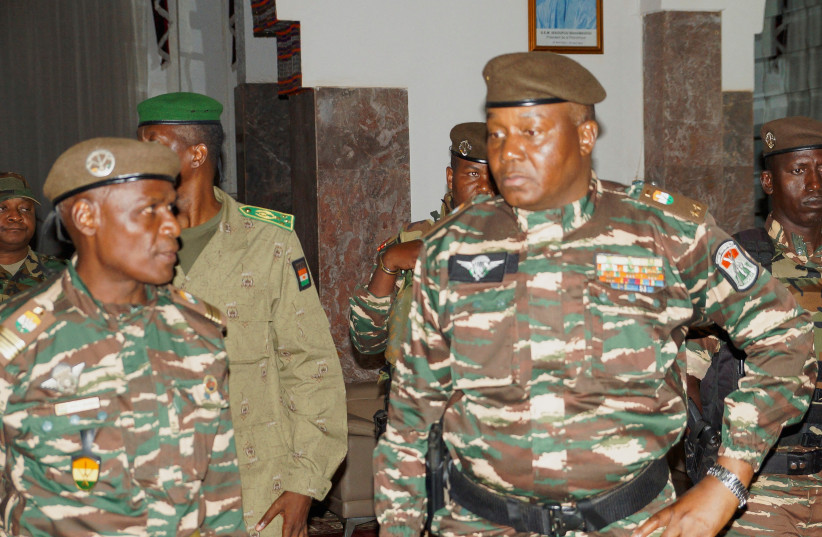As countries in West Africa were considering military intervention in Niger, where there was a recent coup, other coup plotters decided to upstage them with a coup in Gabon.
The group of countries ECOWAS was preparing for possible action over the Niger crisis, and France was in the spotlight because its ambassador in the country had defied a 48-hour deadline to leave. French President Emmanuel Macron supports the ambassador’s decision to stay despite protests and a deteriorating situation.
“France and its diplomats have faced particularly difficult situations in some countries in recent months, from Sudan, where France has been exemplary, to Niger at this very moment,” Macron said in Paris.
Despite the focus on Niger, another coup was unfolding in Gabon, around 800 km. south of Niger. In this case, the election of President Ali Bongo for a controversial third term led military officers to make a move. They announced on television in the early-morning hours that they had taken power.
This has raised eyebrows around the world – particularly in the Middle East. Africa, especially the Sahel, is very important for countries in the Middle East because of its connections to the Arab and Muslim world and how it also feeds extremism. Instability is a threat.

In Iran, pro-government media noted that Gabon is in Central Africa and is one of the most important allies of France. It has been governed by President Bongo since 2009. Third terms are controversial in this region. Senegal’s Macky Sall recently had to step aside from running again due to protests. Elections are often disputed as well. An election in Zimbabwe was also disputed recently. Gabon’s is no exception.
The era of coups rises in Sahel
The era of coups is also increasing. Gabon now joins half a dozen countries that have suffered coups recently. This is reminiscent of the 1970s. The coups come after an era of democratization in parts of Africa. The rise of extremist groups and civil conflicts, however, such as the conflict in Mali or Boko Haram in Nigeria, tend to feed these events. There have been ongoing conflicts in the Central African Republic, and there is fear that the problems in places such as Mali could cascade south toward Ghana and elsewhere.
Bongo had claimed victory overnight, asserting that Ondo Ossa came in second place with 30.77%.
“Bongo’s team have rejected Ondo Ossa’s allegations of electoral irregularities,” France 24 reported. “Tensions are running high amid fears of unrest after Saturday’s presidential, parliamentary, and legislative vote, which saw Bongo seeking to extend his family’s 56-year grip on power while the opposition pushed for change in the oil-rich but poverty-stricken Central African nation. A lack of international observers, the suspension of some foreign broadcasts, and the authorities’ decision to cut Internet service and impose a nighttime curfew nationwide after the poll has raised concerns about the transparency of the electoral process.”
The army in Gabon is emboldened. This is the eight coup in the region. In July, the government of Niger was overthrown. Niger was an important ally of France and the US, and operations against extremists are staged from Niger. Now, that might all be over. Russia’s hands want to move into Niger, and other countries in the region want France and other Western countries to stop meddling.
Neighboring Mali also had several coups. In 2020, military officers took control. In 2022, another officer overthrew his former friends. Mali has done outreach to Russia and Iran. In Chad, the killing of longtime leader Idris Deby in 2021 in clashes with rebels also led to instability. Recently, Chad has seen clashes with forces linked to eastern Libya’s Khalifa Haftar. There have also been coups in Guinea in 2021 and Burkina Faso in 2022.
Sudan is also gripped by a civil war. Recently, the Sudanese military, which also controls the country due to a coup, sent its leader to Egypt to hold discussions. The paramilitary forces fighting against the army in Sudan are linked to tribal militias that see themselves as part of a pan-Sahel group of tribes.
The coup in Gabon will now bookend the rest of the coups across the Sahel. The whole region, which is strategically important and historically a place where extremists have found roots, is now in the grip of epic instability. This means that groups such as al-Qaeda, Boko Haram and others can put down roots. The role of groups such as ECOWAS will look weak if they are unable to shore up the remaining non-coup countries.
Meanwhile, in Senegal, which sits at the far western side of the Sahel and is an important lynchpin for security in the region, it appears that President Macky Sall will step aside. He had also contemplated clinging to power. Such decisions have fueled the chaos as well.
Militaries now no longer feel any check on their power. If they feel a politician isn’t fit for office, they are ready to remove leaders, and the number of countries that are safe from this pattern in the Sahel appears to be diminishing.
It’s worth noting that this will impact North Africa and can affect migration and also the inability of these countries to handle other crises, such as environmental and terrorist threats.
